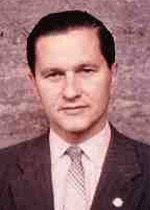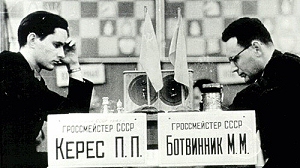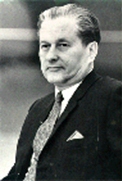Keres Paul Petrovic (07.01.1916 – 05.06.1975)
 Estonian Grandmaster (1950), International Arbiter (1974) and an Honored Soviet Sport Master.
Estonian Grandmaster (1950), International Arbiter (1974) and an Honored Soviet Sport Master.
From 1936, Keres was one of the best eight chess players in the world for twenty five years. He learnt to play chess at the age of four and at 13 he won second place at the Piarnu Championship.
In 1934-35 he won the national championship and also participated in the Chess Olympiad of Warsaw 1935; his performance was considered to be the best because he won more games than any other player. Keres won the European Correspondence Championship in 1936, winning 10 out of 13 games and he was the captain and player of the Estonian chess team at the 1937 and 1939 Olympiads. He continued to play brilliantly, he was equal first at Bad Nauheim 1935 with Alexander Alekhine and in Margate, 1937 he shared the first place with Reuben Fine, followed by Alekhine. In 1937 he came first in a very strong tournament at Semmering-Baden followed by Fine, Capablanca, Reshevsky and Flohr. In 1938, Keres took part in the AVRO tournament where he won shared first with Ruben Fine +3=11 and in 1938 his match with Gideon Stahlberg ended with a draw +2=4-2.  He then got the right to be an official challenger chosen by FIDE, but Alekhine avoided any commitment to this on the grounds of a prior agreement to play Salo Flohr. However, the start of World War II destroyed all his plans. During 1939-40 he played a match with Max Euwe and beat him with the score +6=3-5. In 1940, Keres became a Soviet citizen because Estonia merged with the Soviet Union. Keres participated in the “Absolute Championship of the USSR” match split between Leningrad and Moscow, where he came second behind Mikhail Botvinik followed by Vassily Smyslov and Isaac Boleslavsky. In 1942 he took the second prize at Salzburg behind Alekhine and in 1943 at Salzburg he shared first place with Alexander Alekhine. He was the winner of the 1947, 1950 and 1951 USSR Championships. Keres participated in seven Candidates’ Tournaments. Further results of his included: Budapest 1950, 4th; Neuhausen-Zurich 1953, shared 2nd with Reshevsky, Amsterdam 1956, 2nd behind Smyslov; Bled-Zagreb-Belgrade 1959, 2nd and Curacao 1962, 2nd with Efim Geller.
He then got the right to be an official challenger chosen by FIDE, but Alekhine avoided any commitment to this on the grounds of a prior agreement to play Salo Flohr. However, the start of World War II destroyed all his plans. During 1939-40 he played a match with Max Euwe and beat him with the score +6=3-5. In 1940, Keres became a Soviet citizen because Estonia merged with the Soviet Union. Keres participated in the “Absolute Championship of the USSR” match split between Leningrad and Moscow, where he came second behind Mikhail Botvinik followed by Vassily Smyslov and Isaac Boleslavsky. In 1942 he took the second prize at Salzburg behind Alekhine and in 1943 at Salzburg he shared first place with Alexander Alekhine. He was the winner of the 1947, 1950 and 1951 USSR Championships. Keres participated in seven Candidates’ Tournaments. Further results of his included: Budapest 1950, 4th; Neuhausen-Zurich 1953, shared 2nd with Reshevsky, Amsterdam 1956, 2nd behind Smyslov; Bled-Zagreb-Belgrade 1959, 2nd and Curacao 1962, 2nd with Efim Geller.
 In 1965, Keres won a match against Wolfgang Unzicker with the score +4=4. In the period 1952-1965, he was first in Budapest 1952, followed by Efim Geller, Maikhail Botvinnik and Vassily Smyslov, shared first place in Hastings with Vassily Smyslov in 1954-55, was first in Zurich 1961 followed by Tigran Petrosian, equal first with Tigran Petrosian in Los Angeles 1963, first at Beverwijk 1964 and shared first with Vlastimil Hort at Marianske Lazne 1965. In 1962 he was claimed Estonian Sportsman of the year. In 1970 Keres took part in the Match of the Century and showed the best result among Soviet chess players, having won against Borislav Ivkov 3:1 on the tenth board.
In 1965, Keres won a match against Wolfgang Unzicker with the score +4=4. In the period 1952-1965, he was first in Budapest 1952, followed by Efim Geller, Maikhail Botvinnik and Vassily Smyslov, shared first place in Hastings with Vassily Smyslov in 1954-55, was first in Zurich 1961 followed by Tigran Petrosian, equal first with Tigran Petrosian in Los Angeles 1963, first at Beverwijk 1964 and shared first with Vlastimil Hort at Marianske Lazne 1965. In 1962 he was claimed Estonian Sportsman of the year. In 1970 Keres took part in the Match of the Century and showed the best result among Soviet chess players, having won against Borislav Ivkov 3:1 on the tenth board.
His last success was the victory in the championship of Vancouver. Keres died of a heart attack in Helsinki and was buried in Tallinn.
Keres was a chess player of universal style, positional manoeuvres with original combinative thinking and excellent tactics. He was also a great analyst, commenting on about one thousand games. As a chess composer he published more than 1700 studies.
Keres was also the author of three volumes of Theory of Chess Openings (1952, 1953 and 1958), three volumes of Grandmaster of Chess (1964, 1966 and 1969) and Practical chess endings (1974). One of his best games:



